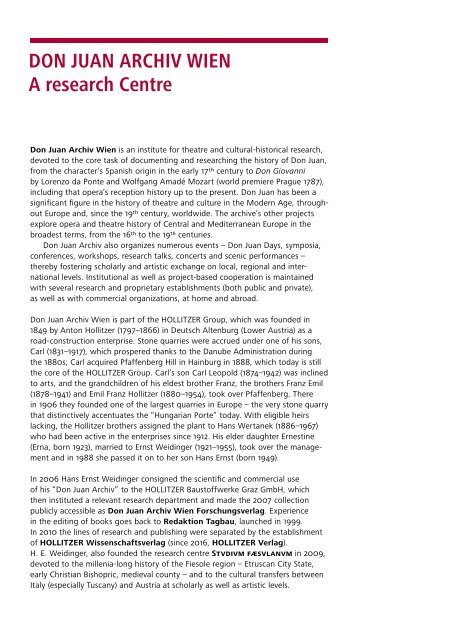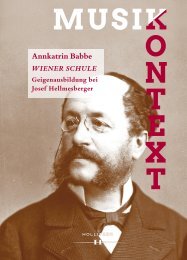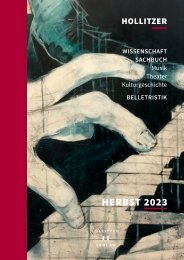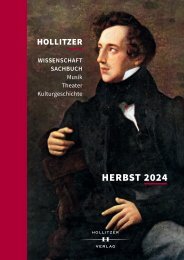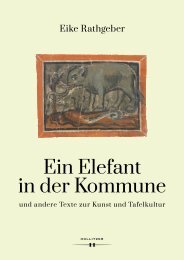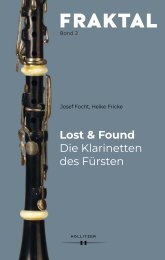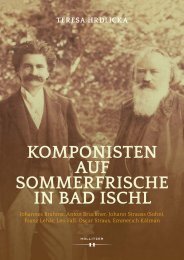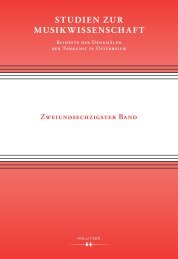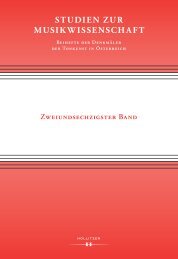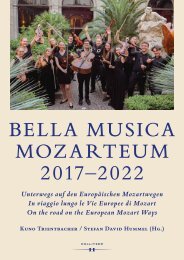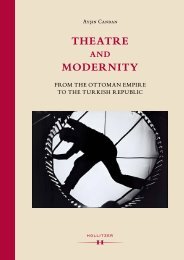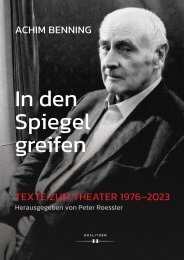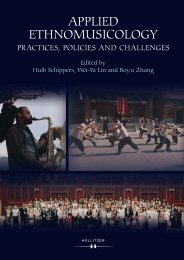Create successful ePaper yourself
Turn your PDF publications into a flip-book with our unique Google optimized e-Paper software.
DON JUAN ARCHIV WIEN<br />
A research Centre<br />
Don Juan Archiv Wien is an institute for theatre and cultural- historical research,<br />
devoted to the core task of documenting and researching the history of Don Juan,<br />
from the character’s Spanish origin in the early 17th century to Don Giovanni<br />
by Lorenzo da Ponte and Wolfgang Amadé Mozart (world premiere Prague 1787),<br />
including that opera’s reception history up to the present. Don Juan has been a<br />
significant figure in the history of theatre and culture in the Modern Age, throughout<br />
Europe and, since the 19th century, worldwide. The archive’s other projects<br />
explore opera and theatre history of Central and Mediterranean Europe in the<br />
broadest terms, from the 16th to the 19th centuries.<br />
Don Juan Archiv also organizes numerous events – Don Juan Days, symposia,<br />
conferences, workshops, research talks, concerts and scenic performances –<br />
thereby fostering scholarly and artistic exchange on local, regional and international<br />
levels. Institutional as well as project-based cooperation is maintained<br />
with several research and proprietary establishments (both public and private),<br />
as well as with commercial organizations, at home and abroad.<br />
Don Juan Archiv Wien is part of the HOLLITZER Group, which was founded in<br />
1849 by Anton Hollitzer (1797–1866) in Deutsch Altenburg (Lower Austria) as a<br />
road-construction enterprise. Stone quarries were accrued under one of his sons,<br />
Carl (1831–1917), which prospered thanks to the Danube Administration during<br />
the 1880s; Carl acquired Pfaffenberg Hill in Hainburg in 1888, which today is still<br />
the core of the HOLLITZER Group. Carl’s son Carl Leopold (1874–1942) was inclined<br />
to arts, and the grandchildren of his eldest brother Franz, the brothers Franz Emil<br />
(1878–1941) and Emil Franz Hollitzer (1880–1954), took over Pfaffenberg. There<br />
in 1906 they founded one of the largest quarries in E urope – the very stone quarry<br />
that distinctively accentuates the “Hungarian Porte” today. With eligible heirs<br />
lacking, the Hollitzer brothers assigned the plant to Hans Wertanek (1886–1967)<br />
who had been active in the enterprises since 1912. His elder daughter Ernestine<br />
(Erna, born 1923), married to Ernst Weidinger (1921–1955), took over the management<br />
and in 1988 she passed it on to her son Hans Ernst (born 1949).<br />
In 2006 Hans Ernst Weidinger consigned the scientific and commercial use<br />
of his “Don Juan Archiv” to the HOLLITZER Baustoffwerke Graz GmbH, which<br />
then instituted a relevant research department and made the 2007 collection<br />
publicly accessible as Don Juan Archiv Wien Forschungsverlag. Experience<br />
in the editing of books goes back to Redaktion Tagbau, launched in 1999.<br />
In 2010 the lines of research and publishing were separated by the establishment<br />
of HOLLITZER Wissenschaftsverlag (since 2016, HOLLITZER Verlag).<br />
H. E. Weidinger, also founded the research centre Stvdivm fÆsvlanvm in 2009,<br />
devoted to the millenia-long history of the Fiesole region – Etruscan City State,<br />
early Christian Bishopric, medieval county – and to the cultural transfers between<br />
Italy (especially Tuscany) and Austria at scholarly as well as artistic levels.


